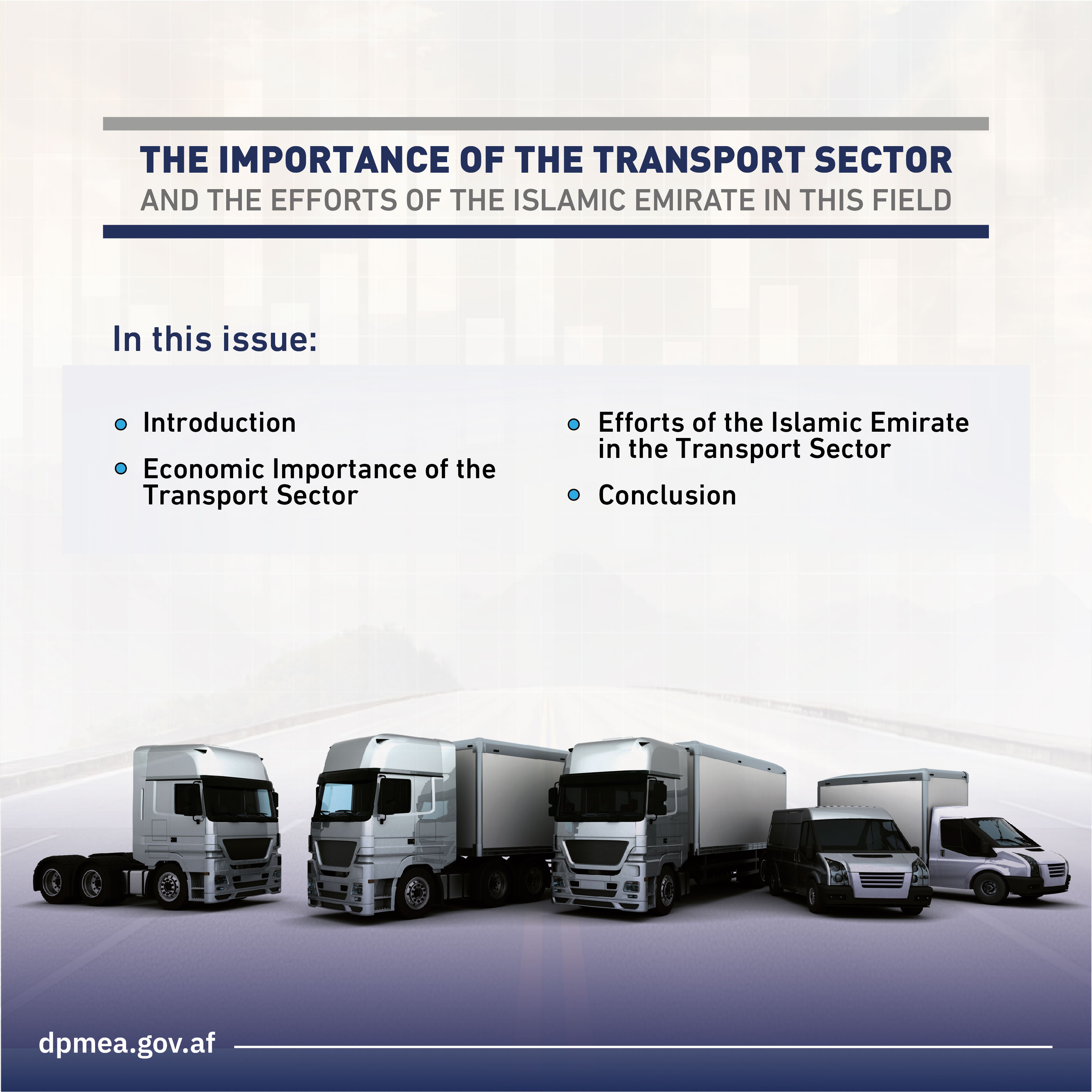The Importance of the Transport Sector and the Efforts of the Islamic Emirate in this Field

By Abdullah Aimal
Introduction
Transportation in Afghanistan is a significant topic due to the country’s unique geographical location. Afghanistan has long served as a bridge for caravans and traders traveling between Central and South Asia. However, the development of modern transportation has faced some challenges. Today, Afghanistan’s transportation infrastructure remains limited and damaged. Major highways and roads connecting key cities require repair and rehabilitation in certain sections. Access to many remote areas is challenging due to the lack of adequate infrastructure. In terms of air transport, only a limited number of domestic and international airports are operational. Recognizing this, the Islamic Emirate has prioritized the restoration of roads and transportation routes in its plans and has actively started working on major highways.
Economic Importance of the Transport Sector
Transport holds immense importance in the national economy and plays a vital role in Afghanistan's economic, social, and commercial development. Below are some key points highlighting its importance:
Facilitating Domestic and Foreign Trade: Transport aids Afghanistan’s domestic and international trade and provides access to regional and global markets. This is especially significant for Afghanistan, as it can leverage transit networks to serve as a bridge between Central Asia, South Asia, and the Middle East.
Increasing Employment Opportunities: Expanding transportation infrastructure and networks creates new job opportunities. This includes creating jobs in road construction, railway expansion, and the establishment of transportation hubs, which contributes to the economy by reducing unemployment and raising income levels.
Boosting Investment and Economic Growth: Reliable transportation networks help attract domestic and foreign investment. Investors seek easy and affordable access to resources, markets, and raw materials, which strong transportation systems enable.
Enhancing Supply Chains and Reducing Costs: Efficient transportation reduces shipping costs and speeds up the transfer of goods, resulting in lower supply chain expenses, making goods and services more affordable.
Strengthening the Tourism Industry: Improving the transport system helps attract both domestic and international tourists. Afghanistan, with its natural and historical landscapes, could benefit economically from tourism if better transportation facilities were available.
Reducing Poverty and Improving Living Standards: Expanding transportation routes improves access to markets and public services in remote and under-resourced areas. This access supports people by providing job opportunities, education, and healthcare, thus enhancing living standards and reducing poverty.
Efforts of the Islamic Emirate in the Transport Sector
The Islamic Emirate has taken several significant steps to enhance and develop the transportation sector. These measures focus on the reconstruction of transport infrastructure, establishing domestic and international transport systems, and reducing costs and difficulties associated with local and international transportation. Key actions taken include:
Reconstruction of Transport Infrastructure: The Islamic Emirate has made considerable efforts to repair and restore key roads, such as major highways and international trade routes. These efforts particularly focus on the Kabul-Kandahar highway, the Salang Highway, and other important routes.
Improving Route Security: Given that security has been a major issue for Afghanistan's transport sector, the Islamic Emirate has aimed to ensure safety on roads and trade routes to facilitate secure transport of goods and passengers.
Expansion of Air Transport: The Islamic Emirate, in collaboration with international organizations, has worked on restarting domestic and international flights. This includes reopening commercial flights and encouraging airlines to maintain regular flights to Afghanistan.
Expansion of Railways: Railway programs have been extended at borders, such as the Khaf-Herat and Uzbekistan-Mazar-e-Sharif lines, creating an economical and secure environment for the movement of goods within the region.
Facilitating Trade: Initiatives for cross-border cooperation with neighboring countries have been implemented to ease trade and goods transportation, helping to reduce transit time and costs.
Developments in Urban Transport: Plans are underway to improve public transport and reduce traffic congestion in major cities like Kabul, Herat, and Mazar-e-Sharif.
Conclusion
Transportation is a crucial part of a country’s economic and social infrastructure, fundamental to the development and progress of any society. Considering Afghanistan's geographic location and the daily needs of its people, improving the transportation system is vital to its economic and social progress. The development of transportation aims to facilitate the transfer of goods and people, reduce time and financial costs, and increase access to public services and domestic and international markets.
The Islamic Emirate has intensified its efforts to expand transportation infrastructure by building and restoring roads, extending railway networks, and improving ports and airports. These efforts will not only create new job opportunities but also improve the country's trade and economy. Additionally, enhanced transportation infrastructure could contribute to attracting foreign investment and promoting tourism in Afghanistan.
In this way, considering the existing capacities and the growing importance of transportation, the Islamic Emirate’s effective actions and comprehensive plans can play a crucial role in Afghanistan’s economic and social development, helping to reduce poverty and improve citizens' living standards.